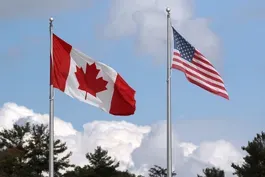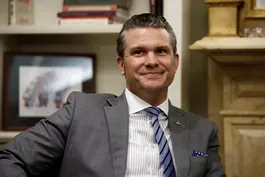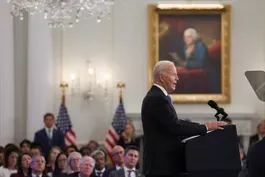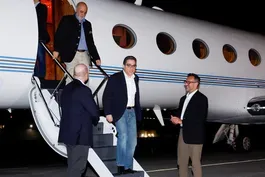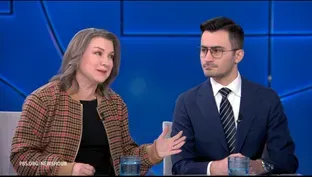
Dangerous winds pick up as crews battle devastating LA fires
Clip: 1/13/2025 | 9m 46sVideo has Closed Captions
Dangerous winds pick up as crews continue to battle devastating LA-area fires
Dangerous wind conditions are picking up speed and threatening to spread devastating fires in Southern California. Four of the major fires have burned through more than 62 square miles. At least 25 people have died, nearly 30 more are missing and several communities have been reduced to ash. Geoff Bennett discussed more with California State Fire Marshal Daniel Berlant.
Major corporate funding for the PBS News Hour is provided by BDO, BNSF, Consumer Cellular, American Cruise Lines, and Raymond James. Funding for the PBS NewsHour Weekend is provided by...

Dangerous winds pick up as crews battle devastating LA fires
Clip: 1/13/2025 | 9m 46sVideo has Closed Captions
Dangerous wind conditions are picking up speed and threatening to spread devastating fires in Southern California. Four of the major fires have burned through more than 62 square miles. At least 25 people have died, nearly 30 more are missing and several communities have been reduced to ash. Geoff Bennett discussed more with California State Fire Marshal Daniel Berlant.
How to Watch PBS News Hour
PBS News Hour is available to stream on pbs.org and the free PBS App, available on iPhone, Apple TV, Android TV, Android smartphones, Amazon Fire TV, Amazon Fire Tablet, Roku, Samsung Smart TV, and Vizio.
Providing Support for PBS.org
Learn Moreabout PBS online sponsorshipAMNA NAWAZ: Welcome to the "News Hour."
Dangerous wind conditions are picking up speed and threatening to spread devastating fires in Southern California.
GEOFF BENNETT: Four of the major fires have burned through more than 62 square miles already.
That's larger than the size of San Francisco or Paris.
At least 24 people have died.
About two dozen more are missing and a number of communities have been reduced to ash.
Officials say they're worried the death toll will grow this week.
In Los Angeles County, it's fire versus firefighters.
After making some progress taming the blazes this weekend, strong Santa Ana winds were expected to pick back up today,fanning the flames and making it harder for crews to extinguish them on the ground and from the sky.
ANTHONY MARRONE, Los Angeles County, California, Fire Chief: The anticipated winds combined with low humidities and low fuel moistures will keep the fire threat in all of Los Angeles County critical.
GEOFF BENNETT: In all, some 8,000 firefighters are battling the two major wildfires in the area.
As of this morning, the enormous Palisades Fire was 14 percent contained and the Eaton Fire was 33 percent contained.
With harsh conditions in the forecast through Wednesday, the city remains on high alert for the fires to worsen or for new ones to ignite.
L.A. Fire Chief Kristin Crowley: KRISTIN CROWLEY, Los Angeles City, California, Fire Chief: We're not in the clear as of yet and we must not let our guard down, as we have right now extreme fire behavior.
GEOFF BENNETT: The fire started last Tuesday and spread quickly.
In the days since, more than 150,000 people have been ordered to evacuate their neighborhoods.
In Santa Anita, near the Eaton Fire, volunteer Angelenos showed up at this parking lot turned donation center, dropping off essential supplies by the truckload, bottle water, diapers and clothing for those who need it most.
JENNIFER DENHARTOG, Volunteer: I just needed to come out and do something to help people.
I don't -- sorry.
I feel so bad for the people, so just wanted to come help somebody.
It's all I can do.
I can't give a bunch of money, but I can come and give my time.
OBIAGELI UGURU, Volunteer: I think the whole city is affected, whether you have actually had your belongings burnt or not.
So, I mean, you can smell the soot in the air, and we're just wanting to get out and do something, like, feel active, that we're actually giving back in some way.
GEOFF BENNETT: To the west, at the edge of the Palisades Fire, dozens of cars lined up this weekend, people hoping to return to their homes to assess the damage and retrieve personal items.
But after hours of waiting, all were denied entry due to hazardous conditions.
AVANTI PRASANNA, California Resident: There's a thankfulness that at least for now my house is still there.
GEOFF BENNETT: Twenty-nine-year-old Avanti Prasanna considers herself one of the lucky ones.
Still, she described a deep communal sense of loss.
AVANTI PRASANNA: I grew up in the Palisades.
My elementary school is gone.
My high school is half gone.
Most of my friends have lost their homes.
So, it's still heartbreaking, even if your house is there, to know that what I always thought was one of the most beautiful neighborhoods in Los Angeles is just gone.
And it'll never be what we knew it as.
GEOFF BENNETT: Yesterday, California Governor Gavin Newsom signed an executive order, suspending the state's landmark environmental laws, as people take the initial steps to rebuild their homes and businesses.
He spoke about it on NBC's "Meet the Press."
GOV.
GAVIN NEWSOM (D-CA): We have got to be thinking three weeks, three months, three years ahead at the same time we're focusing on the immediacy, which is life, safety and property.
California leads the nation in environmental stewardship.
I'm not going to give that up, but one thing I won't give into is delay.
Delay is denial for people.
GEOFF BENNETT: Officials say that residents will be allowed to return only when it's safe.
They also expect the death toll will rise as search crews continue to identify victims in the fire zone.
ROBERT LUNA, Los Angeles County, California, Sheriff: People are saying, I just want to go look at my house and I want to see what's left.
We know that, but we have people literally looking for the remains of your neighbors.
Please be patient with us.
GEOFF BENNETT: With a dangerous fire weather forecast expected to extend at least through Wednesday, let's turn now to California's state fire marshal, Daniel Berlant, for more on the conditions and the unprecedented challenges that firefighters continue to face across the region.
Thanks so much for being with us.
DANIEL BERLANT, California State Fire Marshal: Thanks.
GEOFF BENNETT: These fires remain largely uncontained and you have got millions of people in Southern California who are forecast to be in critical fire risk zones, as we said, at least through midweek.
What are the persistent challenges that your crews are facing at this moment?
DANIEL BERLANT: While we are making progress on a number of fronts on the current fires, as you mentioned, we are gearing up, we are preplanning for significant winds over the next couple of days.
That may not only hamper the efforts that we have been making on the Eaton Fire and on the Palisades Fire, but it could, if there is a new ignition throughout Southern California with these winds, could lead to another major destructive fire or many of them.
And so we are working with our local partners prepositioning even more fire resources so that, if a new fire does break out, we can quickly respond to it.
GEOFF BENNETT: What about the availability of water?
That was a major issue early on.
What's the latest there?
DANIEL BERLANT: Yes, well, there's been some early reports on the first night on water pressure.
Obviously, the sheer number of fire hydrants that were being used to battle this fire put a huge strain on the watering system.
And so we leaned in and very quickly mobilized 140 additional water tenders.
That's additional to what was on the initial attack from L.A. City and L.A. County Fire Department, bringing in water trucks to ensure that there was plenty of water to help battle these fires.
Many of our wildland fires, we don't have fire hydrants to access in mountainous or inaccessible terrain.
And so we often use other tools that our firefighters carry to help us towards our containment efforts.
But bringing in all types of resources has been focused from night one of this fire.
And now that we are a week in, we have continued to see that mobilization pay off, over 1,000 firefighters today on the front lines from other states, the military, the National Guard all assisting with this.
These resources, again, are making a difference.
GEOFF BENNETT: One thing we have heard from other fire officials is that, beyond just battling these blazes, you're also having to compete with misinformation online.
How is that complicating the response effort?
DANIEL BERLANT: Yes, there is a lot of misinformation out there.
Now, the governor launched a Web site to provide facts to the public.
It's difficult in times of disaster for people to always understand exactly what's happening, the first 24 hours questioning why there was no aircraft over the fire and not understanding that, when you have hurricane-level winds, you cannot only not fly fire retardant aircraft effectively using that retardant.
It never is even able to make the ground.
The wind just dissipates it, but, also, it is unsafe for our pilots at that level.
And so we have been really working hard to try to ensure that we're getting information out, focusing in on what matters.
And that is the people that are immediately impacted by this wildfire, making sure they have early evacuation information, making sure they have clear directions on what to do while we work to make sure everybody in the region, in our state, in our nation know what's happening in this natural disaster.
We have to focus on the people that are immediately impacted by the wildfire.
GEOFF BENNETT: Looking at the weather forecast, am I right in assuming that it could take toward the end of the week before any of these fires are contained?
DANIEL BERLANT: It is very likely, not knowing what the winds will actually do on the fire the next couple of days, that we will be on the front lines of these fires for several weeks to come, if not several months.
Obviously, we will work very hard, as we have been, towards full containment efforts, but it is way too early for us to estimate exactly when that might be.
Right now, firefighters are continuing to mop up hot spots, continuing to extinguish flare-ups that are occurring, building containment line all the way around that fire, all despite continued abnormal temperatures and conditions in the month of January.
And then the winds that we have been discussing, that too is only going to challenge us.
And so we are working as hard as we can to make sure that we get containment on these fires, but it is too early to know exactly when that might be.
GEOFF BENNETT: A weeks- or month-long firefighting effort, is that right?
DANIEL BERLANT: Very easily.
Now, we are looking -- while we are focused on the next several days with strong winds, we're continuing to monitor the long-term weather forecast.
We could experience rain.
We are leaning in hard with making sure that we're assessing the burned areas, that we're working with our partners for flooding concerns, with debris removal concerns.
And so we may very quickly in the next couple of weeks shift from a firefight to a flood operation.
And, obviously, there's a number of other state agencies and entities that play a critical role in that effort.
So the natural disaster, if you will, may be months in the making here and in the work to fully contain it, as we potentially transition to -- from wildfires to flooding.
Again, work happening now, though, to try to shore up and protect the communities before that rain does occur.
GEOFF BENNETT: Well, our best to you and your colleagues.
California State Fire Marshal Daniel Berlant, thanks again for your time this evening.
DANIEL BERLANT: Thanks.
Ambassador says Canada prepared for any scenario with Trump
Video has Closed Captions
Canadian ambassador to U.S. on tensions with Trump: 'We are prepared for any scenario' (6m 22s)
Hegseth hearings to begin amid sexual misconduct accusations
Video has Closed Captions
Hegseth confirmation hearings to begin amid sexual misconduct accusations (7m 20s)
News Wrap: Biden defends legacy on world stage in address
Video has Closed Captions
News Wrap: Biden defends legacy on world stage in address at State Department (5m 37s)
Roger Carstens reflects on bringing detained Americans home
Video has Closed Captions
Hostage negotiator Roger Carstens reflects on his efforts to bring detained Americans home (7m 55s)
Tamara Keith and Andrew Desiderio on wildfire politicization
Video has Closed Captions
Tamara Keith and Andrew Desiderio on the politicization of the California wildfires (8m 18s)
What makes Greenland a strategic polar outpost
Video has Closed Captions
Why Trump wants Greenland and what makes it a strategic polar outpost (6m 24s)
Providing Support for PBS.org
Learn Moreabout PBS online sponsorshipMajor corporate funding for the PBS News Hour is provided by BDO, BNSF, Consumer Cellular, American Cruise Lines, and Raymond James. Funding for the PBS NewsHour Weekend is provided by...

